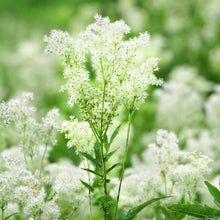
Wheel of the year wildflower seeds
Mabon seed packet -Native wildflower meadowsweet seeds
Meadowsweet is an herb in the rose family. For centuries, it’s been used in traditional medicine to alleviate joint pain, heartburn, and more.
It contains many compounds thought to have anti-inflammatory effects in your body, including salicylates and tannins
Benefits
Digestive Health
As a digestive aid, the Meadowsweet herb is hard to beat. It soothes and protects the mucous membranes of the digestive tract and stomach lining whilst reducing acidity. Studies have found that Meadowsweet can also promote the healing of chronic ulcers and prevent lesions from developing in the stomach. It is used in the treatment of heartburn, hyperacidity, gastritis and peptic ulceration. Its gentle astringency is useful in treating diarrhoea, especially in children.
Meadowsweet extract has also been shown in scientific research to inhibit the growth of the Helicobacter pylori bacteria. Whilst many people can have this bacteria living inside them for an entire lifetime and not know about it, this silent but potentially deadly bacteria can wreak havoc within the gastric system. Not only can it increase the risk of developing gastric cancer by up to 6 times, it is often at the root of many other digestive problems such as ulcers and gastritis.
Anti-Inflammatory
Containing salicylic acid, Meadowsweet is an effective herb against inflammation. It is now thought that most diseases can be traced back to chronic low-level inflammation, making this herb an extremely useful tool in your natural health kit. Salicylic acid is more famously known to come from Willow, however the other compounds within Meadowsweet make it much easier on the lining of the stomach.
Folklore and history
Meadowsweet was a celebrated herb in Celtic times, representing the Flowerbride, otherwise known as "Blodeuwedd" - the maiden aspect of the triple goddess.
This gentle flower was used to attract love, peace and happiness and was especially popular in love spells and potions. Adding this flower to a bridal bouquet was thought to bring joy and blessings to the bride!
Also enjoying a long history as a strewing herb, Meadowsweet's flowery, astringent properties made it an excellent choice for dwellings, serving as an insect repellent as well as a disinfectant.
In 1838 an Italian professor, Rafaele Piria, produced salicylic acid from the flower buds of Meadowsweet. In 1897 Felix Hoffmann, working for the German drug company Bayer, synthesised salicin based on the study of meadowsweet which was better tolerated by the stomach lining. Bayer named the new drug aspirin, derived from an old botanical name for meadowsweet: Spiraea ulmaria. This in turn gave us the important class of Non-steroidal Anti-inflammatory Drugs (NSAIDs), still widely used today.
Traditional use
Meadowsweet has a long and distinguished history of medicinal use and is mentioned in some of the most famous literary works of the middle ages. Meadowsweet was one of the three herbs held to be most sacred by the Celtic druids and was historically used to flavour mead – hence its folk name “mead wort”.
It has also been mentioned in various herbal compendiums including those written by Culpeper and Gerard. Culpeper was of the opinion that Meadowsweet could be used to dry the body out, stop bleeding, vomiting, diarrhoea and excessive menstruation.
It was also known to be rich in salicylic acid (of Willow bark fame), which is effective for pain relief and was touted many centuries ago as being an excellent remedy for moderate pain, especially pain in a fixed area of the body such as headaches.
Typical use
Constituents
Volatile oil containing salicylaldehyde, phenolic glycosides (including spiraein, monotropin and gaultherin), mucilage, flavonoids, tannins, vitamin C, sugar
Precautions
None known.
It grows in damp environments and marshy areas and on riverbanks. It features clustered white flowers that have a pleasant, sweet aroma and are used in medicinal preparations such as teas and extracts.














